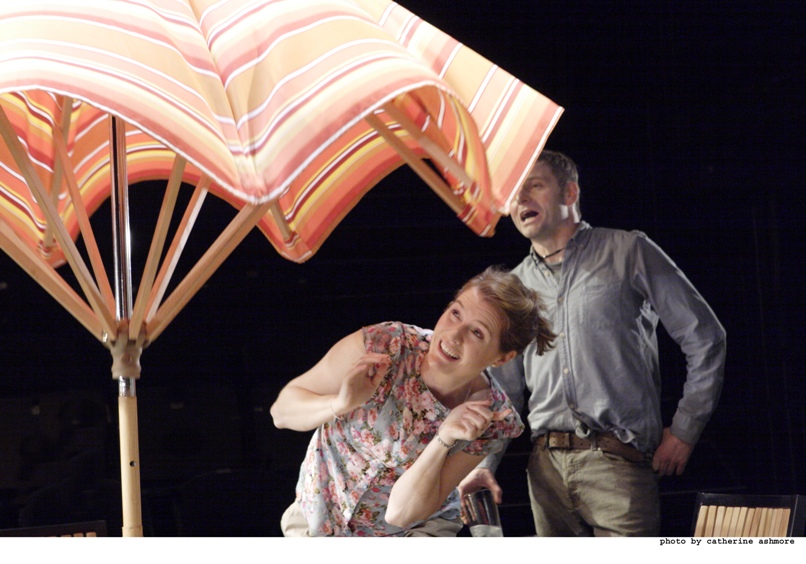The competition for best dramatic use of a coffee table is won hands down by the wagon-wheel one that prompts a major argument in When Harry Met Sally. Runner-up is the one that appears in Detroit. So deliciously hideous that it gets its own laugh, the symbolic table from Ben and Mary’s nice suburban home is given to new neighbours Sharon and Kenny whose total lack of furniture stems from the fact that they only recently met during a spell in major substance-abuse rehab. Their back yards may abut one another but you don’t have to be Robert Frost to realise that since good fences make good neighbours, the lack of a division between them is going to curdle comedy into something much darker.
“I mean who invites their neighbours over for dinner any more?” As Clare Dunne’s ideally scrawny Sharon says it, she isn’t being derisive, she’s delighted. Indeed, a lament for a sense of community lies beneath the cracklingly entertaining surface of Lisa D’Amour’s play, directed by Austin Pendleton at Chicago’s Steppenwolf company in 2010 and now at the National with a zingingly authentic British cast.
 Outside the fact that D’Amour’s setting is the suburb of an unnamed American town (the title is a deliberate misnomer), you could be forgiven for thinking you were at an Ayckbourn drama of social awkwardness. Her sharing of his trademark mix of comedy and pain is blissfully apparent in the opening scene where a gale of laughter greets Ben and Mary’s oh-so-tastefully floral patio umbrella (pictured above right) collapsing down on to Kenny’s head, not to mention Ben’s peace-making line about his barbecued steaks: “You get the first one in honour of your concussion.” But D’Amour has specifically American ideas and ideals in her sights.
Outside the fact that D’Amour’s setting is the suburb of an unnamed American town (the title is a deliberate misnomer), you could be forgiven for thinking you were at an Ayckbourn drama of social awkwardness. Her sharing of his trademark mix of comedy and pain is blissfully apparent in the opening scene where a gale of laughter greets Ben and Mary’s oh-so-tastefully floral patio umbrella (pictured above right) collapsing down on to Kenny’s head, not to mention Ben’s peace-making line about his barbecued steaks: “You get the first one in honour of your concussion.” But D’Amour has specifically American ideas and ideals in her sights.
Exhausted by her job as a para-legal, struggling middle-class Mary (Justine Mitchell) is reaching the end of her tether with her husband Ben (Stuart McQuarrie), a former loan officer who is squandering his redundancy pay-off and flagrantly failing to set up a financial consultancy website. And, as gradually becomes clear, she’s leaning a little too heavily on the bottle to see her through.
That’s in stark initial contrast with Sharon and Kenny (Will Adamsdale) whose confident claims to be making a fresh start encourages these sharply observed neighbourly get-togethers. Their social differences are mined for major comic embarrassment yet as the characters niggle one other, their positions – the haves vs the have-not-and-never-wills – are moved into focus in relation to the American Dream. And if that sounds like reviewer’s cliché, D’Amour consciously invites it via several references to the characters’ own dreams.
 Unfortunately, long before the climactic meltdown – an impressive theatrical coup it would be mean to spoil – the cracks in the characters’ lives are mirrored by those in D’Amour’s dramaturgy. Given how detailed the performances are, it’s sad that the more intense the relationships grow, the less convincingly they are written. They simply cannot bear the weight of D’Amour’s entirely laudable intention that they symbolise the collapse of traditional American values.
Unfortunately, long before the climactic meltdown – an impressive theatrical coup it would be mean to spoil – the cracks in the characters’ lives are mirrored by those in D’Amour’s dramaturgy. Given how detailed the performances are, it’s sad that the more intense the relationships grow, the less convincingly they are written. They simply cannot bear the weight of D’Amour’s entirely laudable intention that they symbolise the collapse of traditional American values.
That’s most evident in the final scene which, in a peculiar parallel with Mike Bartlett’s Love, Love Love at the Royal Court, flattens the drama by having a character arrive to deliver the playwright’s thesis at extraordinary length. Valid and topical though it may be, dramatic it’s not.
In a rare appearance outside of work of his own devising, Adamsdale is terrific as restless Kenny. He creates a dangerously coiled spring of a man who clearly can keep his ruthlessness at bay for only so long. His body language in relation to Clare Dunne’s strung-out, one-the-edge Sharon is shiveringly plausible.
Stuart McQuarrie, recently a quietly commanding presence in the West End transfer of Clybourne Park, is lovely as Ben, his little flares of obstinacy gently revealing just how much he is flailing beneath a carefully maintained veneer of hope. As Mary, Justine Mitchell rattles dismissively at breakneck speed through a catalogue of her private horrors, her comic timing renders her pain extraordinarily funny. Conversely, her deft use of physical tension – it’s as if she creates a force field around her – makes her untouchably sad.
Individually impressive, their collective performance, ideally balanced by Pendleton, is so strong it almost disguises the flaws in D’Amour’s ambition.
- Detroit is in rep at the Cottesloe, National Theatre, until 14 July















Add comment